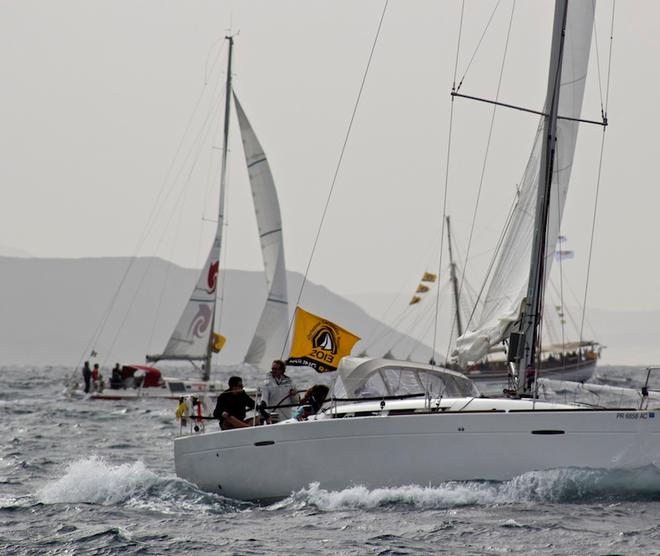CCR, safe holidays, adaptive Antarctic sea urchins—World Cruising news
by David Schmidt, Sail-World Cruising Editor on 18 Dec 2014

Start of the CCR 2013 - Christmas Caribbean Rally 2014 Christmas Caribbean Rally
Holiday traditions vary from country to country, but one thing almost all sailors can appreciate is the desire to actually go sailing during this time of 'winter' brightness and holiday cheer. After all, a sailor can only stomach so many Christmas carols before the memory of wide-open horizons, crisp tradewinds and a gentle following sea dominates all thought. Fortunately for sailors who suffer from this particular 'saline withdrawal' during the yuletide season, the Christmas Caribbean Rally (CCR) can serve as a much needed vacation, or as a great way to cross an ocean for the first time in the relative safety of a supportive and flotilla.
The CCR kicked off this year on December 6 in Marina Rubicon, Lanzarote, with shore-based activities and seminars, and is currently taking the fleet some 2,850 nautical miles to Nelson’s Dockyard in Antigua. According to the rally’s literature, the annual dates are chosen to ensure that hurricane season has passed safely astern and that the tradewinds have settled in for the season.
‘I’m so pleased to finally be here and be part of the CCR this year, and to be able to get to know everyone else in the fleet makes a great atmosphere,' said Mike Broughton, a noted meteorological expert and the skipper of 'Raven', a Beneteau First 45. 'To be crossing the Atlantic in my own boat with my family and in such a close knit fleet makes it a very special event for me.'
Get the full report from the CCR, inside this issue.
While boating over the holidays might seem dreamlike for northern hemisphere readers (who aren’t enjoying the CCR, of course), for plenty of southern hemisphere readers, the holidays are the perfect time to head out onto the water with family and friends. Still, even during this time of annual celebration, it’s important to remember that safety always has to come first-a crucial lesson that the New South Wales (Australia) Roads and Maritime Services is trying to teach via a well-timed public safety announcement.
'Boating can be great fun but it is an activity which requires planning, skill and judgment,' said Angus Mitchell, Roads and Maritime Director Maritime. 'By all means enjoy yourselves but please remember even if you are at anchor, there should be someone on board who is able to drive the boat in the event the weather changes or there is a reason to move the boat.'
Finally, Mitchell offered up a sound piece of advise for boaters of all global regions, irrespective of whether your ride back to your home waters is aboard a Swan 48 or in the driver’s seat of a BMW 5-series. 'Alcohol is involved in at least one third of all boating fatalities and studies have shown boat passengers are just as likely as operators to be involved in incidents such as capsizing the vessel or falling overboard as a result of drinking alcohol,' said Mitchell. More, inside.
And while the human population might be celebrating their big holidays and preparing for the start of a new year, things are far more sober in the Antarctic Peninsula, where scientists have discovered that sea urchins are more adaptable to environmental change (e.g., rising global temperatures and acidification) than previously thought.
'With predictions of warmer, more acidic waters in the future, this work shows how resilient these animals are to climate change,' said Dr. Melody Clark, of the British Antarctic Survey. 'It also emphasizes the importance of conducting long-term experiments in making accurate predictions. These animals live a long time and do everything really slowly.'
One obvious reason for the pace of a sea urchin’s life, especially one living on the Antarctic Peninsula, is water temperature. 'In the cold waters of Antarctica metabolism is slowed which means that animals take longer to develop,' said Dr. Coleen Suckling, of Bangor University. 'This also means that that the time it takes for them to mature and reproduce can be many years. So adaptation through generations might not be a reliable strategy to cope with rapid climate change, both processes occurring at almost similar time scales. Instead, if the animals are able to acclimate, then this might help them cope with future changes.'
Get the full story about these adaptive urchins, inside this issue.
Also inside, learn how coral-eating fish disguise their smell to hide from predators, find out more about the funky spectral signature that seabird poo exhibits in satellite imagery, and-for readers lucky enough to be in Australia (read: summer sailing weather), learn more about the Lakefest Aquatic Week on Lake Macquarie (February 20-27).
May the four winds blow you safely home,
If you want to link to this article then please use this URL: www.sail-world.com/129998